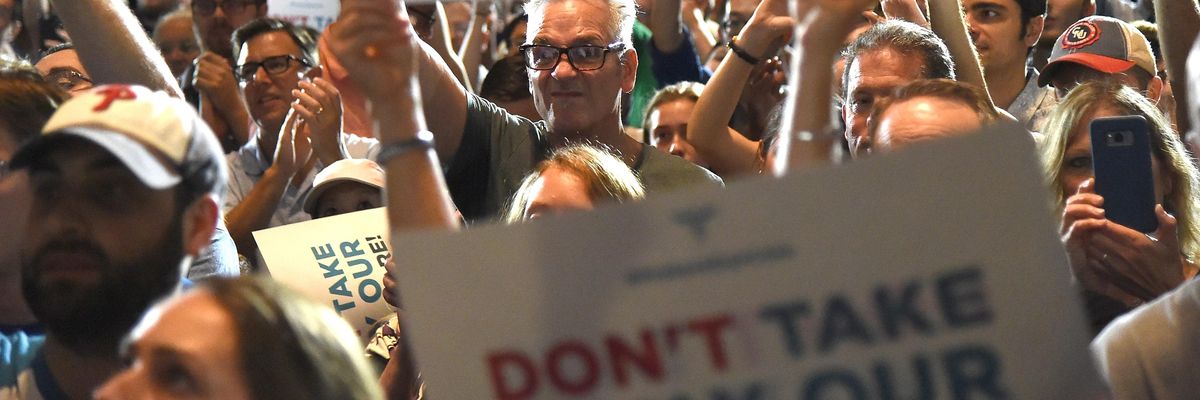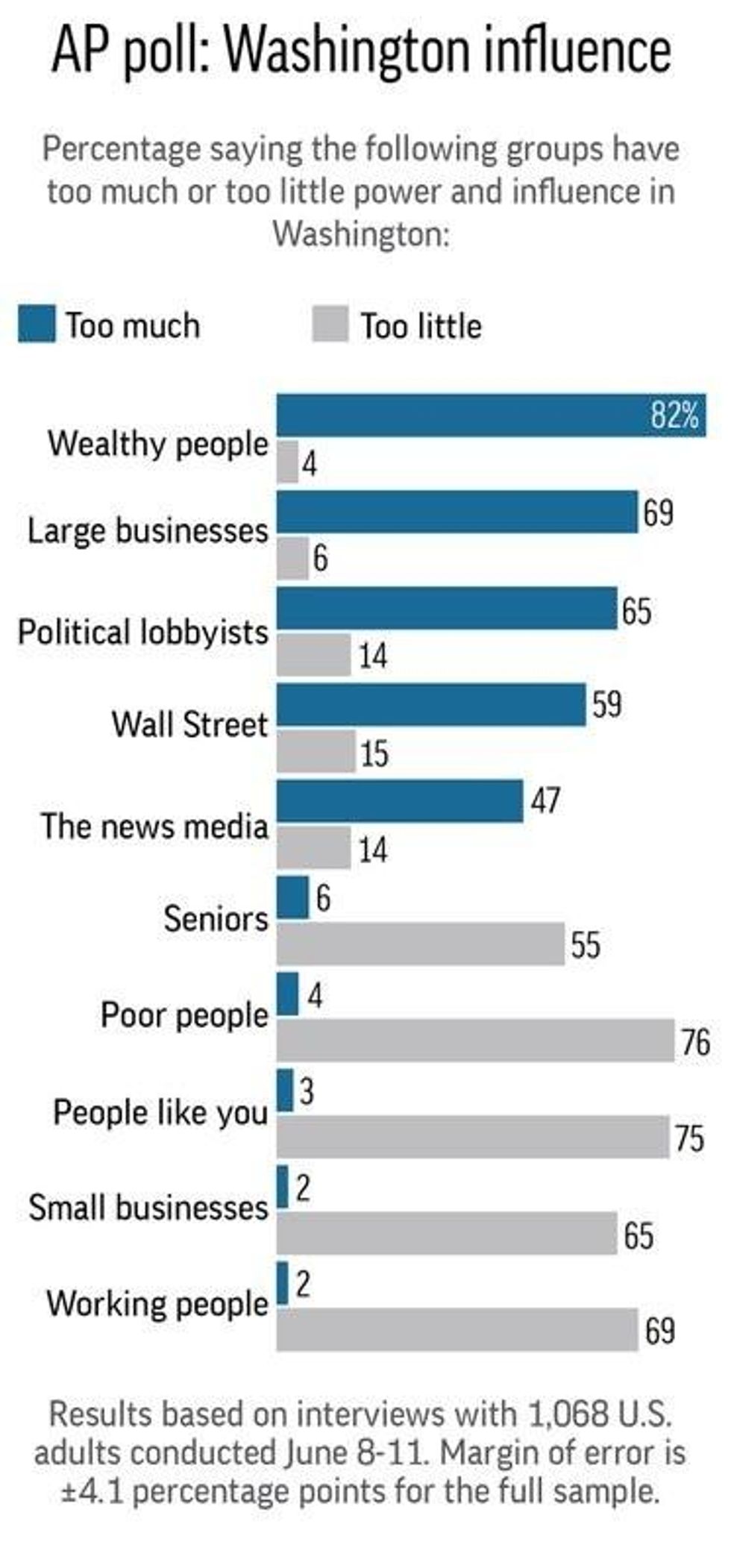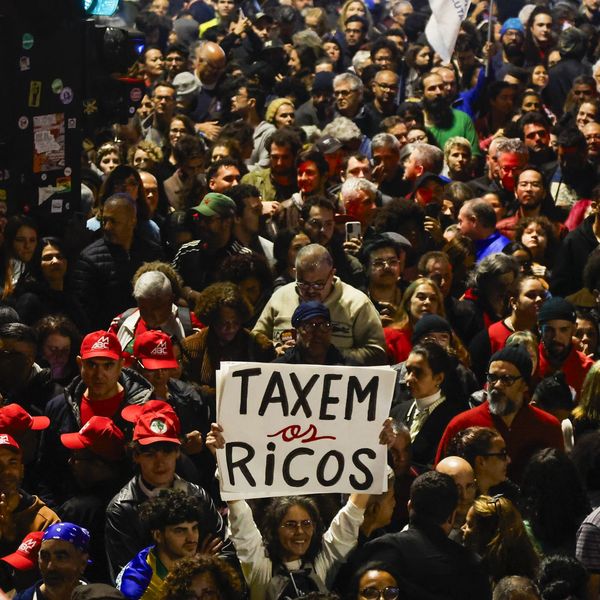
A general view of atmosphere as Pennsylvanians rally to demand that Sen. Pat Toomey (R-PA) vote against Trumpcare during an Emergency Rally with MoveOn.org To Stop Trumpcare held at the Pittsburgh Convention Center on June 24, 2017 in Pittsburgh, Pennsylvania. (Photo: Jason Merritt/Getty Images for MoveOn.org)
Can You Say Oligarchy? 75% of Americans Think Wealthiest Have "Too Much" Power
Bolstering 2014 study detailing how elite interests dominate policy-making, survey shows "rare" agreement that elites run the show while workers and the poor left out
Giving new credence to a provocative 2014 study showing the United States is controlled by powerful elite interests, as opposed to the desire of its citizens, a new poll released Thursday shows that three-quarters of Americans feel voiceless and largely powerless in the nation that heralds itself as the world's preeminent democracy.

The results of the new survey by the Associated Press-NORC Center for Public Affairs Research reveals that 75 percent of Americans--including "rare unanimity across political, economic, racial and geographical lines and including both those who approve and disapprove of President Donald Trump"--agree they have too little influence or say over the decisions made by the nation's elected officials.
According to Linda Bell, a low-income beekeeper and farmer from Texas who took part in the poll, lawmakers in Washington, D.C. "don't care about people like me."
While 82 percents of respondents said that "wealthy people" have "too much" influence, there was strong agreement that regular people have "too little." Alongside the very rich, it was large businesses (69%), political lobbyists (65 %), Wall Street (59%), and the news media (47%) who are all widely perceived as too powerful, while the near total inverse was true of seniors (6%), poor people (4%), small businesses (2%), and "people like you" (4%).
As AP notes, "The results are notable because Trump won his presidency with a populist call-to-arms to make 'forgotten Americans' his priority and to restore jobs to people still struggling amid the economy's recovery."
Also telling about the polls results, is how they bolster the findings of groundbreaking 2014 study by Princeton University's Martin Gilens and Northwestern University's Benjamin Page which offered a scientific analysis detailing how, in the United States, the "economic elites and organized groups representing business interests have substantial independent impacts on U.S. government policy, while average citizens and mass-based interest groups have little or no independent influence."
Demonstrating its conclusions, the study offered broad empirical evidence including data that showed how "a proposed policy change with low support among economically elite Americans (one-out-of-five in favor) is adopted only about 18% of the time, while a proposed change with high support (four-out-of-five in favor) is adopted about 45% of the time."
On the other hand, the study continued, "When a majority of citizens disagrees with economic elites and/or with organized interests, they generally lose. Moreover, because of the strong status quo bias built into the US political system, even when fairly large majorities of Americans favor policy change, they generally do not get it."
This dynamic has helped explain that even as increasing numbers of Americans say they support programs like universal healthcare coverage or tuition-free higher education, the possibility of such changes to the system is treated as impractical because of the elite interests that oppose them.
Though neither Gilens and Page nor the new AP/NORC poll employ the term "oligarchy" in their language, many outside observers say that is exactly what the United States--with elections dominated by corporate and private wealth and a media industry dominated the economic elite--has become.
Merriam-Webster defines the word as, "government by the few."
Though many still deny it, Common Dreams contributor John Atcheson explains on Thursday why the reality of an American oligarchy--one that bends to the will of the wealthy and powerful while denying equity and progress to the large majority--is not just the proverbial elephant in the room, but rather "a huge honking beast squatting squarely on our ottoman."
An Urgent Message From Our Co-Founder
Dear Common Dreams reader, The U.S. is on a fast track to authoritarianism like nothing I've ever seen. Meanwhile, corporate news outlets are utterly capitulating to Trump, twisting their coverage to avoid drawing his ire while lining up to stuff cash in his pockets. That's why I believe that Common Dreams is doing the best and most consequential reporting that we've ever done. Our small but mighty team is a progressive reporting powerhouse, covering the news every day that the corporate media never will. Our mission has always been simple: To inform. To inspire. And to ignite change for the common good. Now here's the key piece that I want all our readers to understand: None of this would be possible without your financial support. That's not just some fundraising cliche. It's the absolute and literal truth. We don't accept corporate advertising and never will. We don't have a paywall because we don't think people should be blocked from critical news based on their ability to pay. Everything we do is funded by the donations of readers like you. Will you donate now to help power the nonprofit, independent reporting of Common Dreams? Thank you for being a vital member of our community. Together, we can keep independent journalism alive when it’s needed most. - Craig Brown, Co-founder |
Giving new credence to a provocative 2014 study showing the United States is controlled by powerful elite interests, as opposed to the desire of its citizens, a new poll released Thursday shows that three-quarters of Americans feel voiceless and largely powerless in the nation that heralds itself as the world's preeminent democracy.

The results of the new survey by the Associated Press-NORC Center for Public Affairs Research reveals that 75 percent of Americans--including "rare unanimity across political, economic, racial and geographical lines and including both those who approve and disapprove of President Donald Trump"--agree they have too little influence or say over the decisions made by the nation's elected officials.
According to Linda Bell, a low-income beekeeper and farmer from Texas who took part in the poll, lawmakers in Washington, D.C. "don't care about people like me."
While 82 percents of respondents said that "wealthy people" have "too much" influence, there was strong agreement that regular people have "too little." Alongside the very rich, it was large businesses (69%), political lobbyists (65 %), Wall Street (59%), and the news media (47%) who are all widely perceived as too powerful, while the near total inverse was true of seniors (6%), poor people (4%), small businesses (2%), and "people like you" (4%).
As AP notes, "The results are notable because Trump won his presidency with a populist call-to-arms to make 'forgotten Americans' his priority and to restore jobs to people still struggling amid the economy's recovery."
Also telling about the polls results, is how they bolster the findings of groundbreaking 2014 study by Princeton University's Martin Gilens and Northwestern University's Benjamin Page which offered a scientific analysis detailing how, in the United States, the "economic elites and organized groups representing business interests have substantial independent impacts on U.S. government policy, while average citizens and mass-based interest groups have little or no independent influence."
Demonstrating its conclusions, the study offered broad empirical evidence including data that showed how "a proposed policy change with low support among economically elite Americans (one-out-of-five in favor) is adopted only about 18% of the time, while a proposed change with high support (four-out-of-five in favor) is adopted about 45% of the time."
On the other hand, the study continued, "When a majority of citizens disagrees with economic elites and/or with organized interests, they generally lose. Moreover, because of the strong status quo bias built into the US political system, even when fairly large majorities of Americans favor policy change, they generally do not get it."
This dynamic has helped explain that even as increasing numbers of Americans say they support programs like universal healthcare coverage or tuition-free higher education, the possibility of such changes to the system is treated as impractical because of the elite interests that oppose them.
Though neither Gilens and Page nor the new AP/NORC poll employ the term "oligarchy" in their language, many outside observers say that is exactly what the United States--with elections dominated by corporate and private wealth and a media industry dominated the economic elite--has become.
Merriam-Webster defines the word as, "government by the few."
Though many still deny it, Common Dreams contributor John Atcheson explains on Thursday why the reality of an American oligarchy--one that bends to the will of the wealthy and powerful while denying equity and progress to the large majority--is not just the proverbial elephant in the room, but rather "a huge honking beast squatting squarely on our ottoman."
Giving new credence to a provocative 2014 study showing the United States is controlled by powerful elite interests, as opposed to the desire of its citizens, a new poll released Thursday shows that three-quarters of Americans feel voiceless and largely powerless in the nation that heralds itself as the world's preeminent democracy.

The results of the new survey by the Associated Press-NORC Center for Public Affairs Research reveals that 75 percent of Americans--including "rare unanimity across political, economic, racial and geographical lines and including both those who approve and disapprove of President Donald Trump"--agree they have too little influence or say over the decisions made by the nation's elected officials.
According to Linda Bell, a low-income beekeeper and farmer from Texas who took part in the poll, lawmakers in Washington, D.C. "don't care about people like me."
While 82 percents of respondents said that "wealthy people" have "too much" influence, there was strong agreement that regular people have "too little." Alongside the very rich, it was large businesses (69%), political lobbyists (65 %), Wall Street (59%), and the news media (47%) who are all widely perceived as too powerful, while the near total inverse was true of seniors (6%), poor people (4%), small businesses (2%), and "people like you" (4%).
As AP notes, "The results are notable because Trump won his presidency with a populist call-to-arms to make 'forgotten Americans' his priority and to restore jobs to people still struggling amid the economy's recovery."
Also telling about the polls results, is how they bolster the findings of groundbreaking 2014 study by Princeton University's Martin Gilens and Northwestern University's Benjamin Page which offered a scientific analysis detailing how, in the United States, the "economic elites and organized groups representing business interests have substantial independent impacts on U.S. government policy, while average citizens and mass-based interest groups have little or no independent influence."
Demonstrating its conclusions, the study offered broad empirical evidence including data that showed how "a proposed policy change with low support among economically elite Americans (one-out-of-five in favor) is adopted only about 18% of the time, while a proposed change with high support (four-out-of-five in favor) is adopted about 45% of the time."
On the other hand, the study continued, "When a majority of citizens disagrees with economic elites and/or with organized interests, they generally lose. Moreover, because of the strong status quo bias built into the US political system, even when fairly large majorities of Americans favor policy change, they generally do not get it."
This dynamic has helped explain that even as increasing numbers of Americans say they support programs like universal healthcare coverage or tuition-free higher education, the possibility of such changes to the system is treated as impractical because of the elite interests that oppose them.
Though neither Gilens and Page nor the new AP/NORC poll employ the term "oligarchy" in their language, many outside observers say that is exactly what the United States--with elections dominated by corporate and private wealth and a media industry dominated the economic elite--has become.
Merriam-Webster defines the word as, "government by the few."
Though many still deny it, Common Dreams contributor John Atcheson explains on Thursday why the reality of an American oligarchy--one that bends to the will of the wealthy and powerful while denying equity and progress to the large majority--is not just the proverbial elephant in the room, but rather "a huge honking beast squatting squarely on our ottoman."

